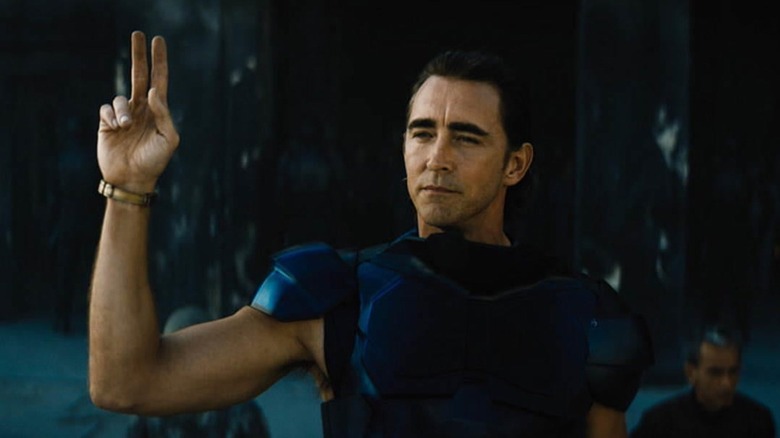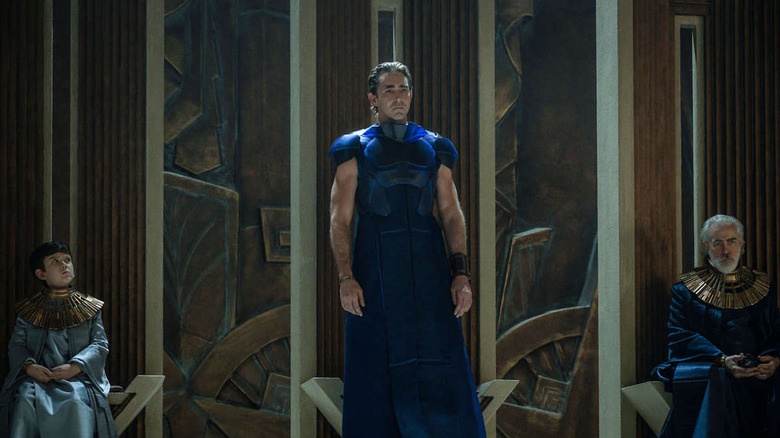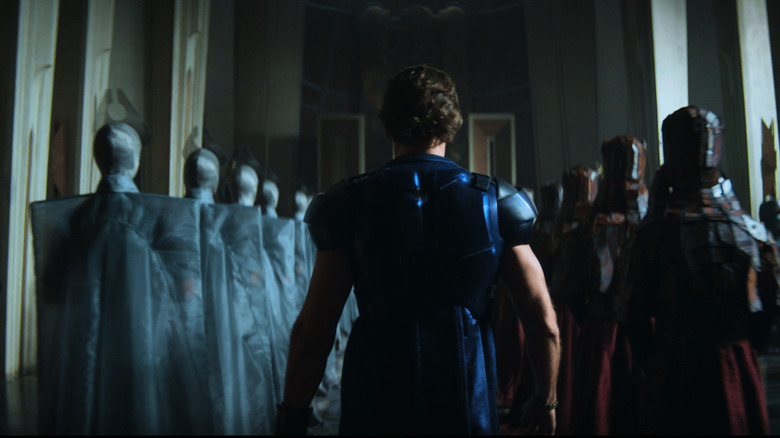Foundation Star Lee Pace On Playing Multiple Generations Of A Godlike Clone Emperor [Interview]
It's tricky to explain who Lee Pace plays in "Foundation," Apple's lavish new adaptation of Isaac Asimov's classic science-fiction novels. On one hand, he plays Emperor Cleon, the ruler of the Empire that oversees the known galaxy and its countless planets and civilizations. But he also plays ... Emperor Cleon and Emperor Cleon and Emperor Cleon, the fellow clones of their shared ancestor who ascend to the throne after one version grows older. Pace plays multiple Cleons across the first season of "Foundation," sharing the character with older and younger actors, handing previous version of Cleon off to one another as the character ages across the decades (and sometimes centuries) spanning first season. It's a bit of an acting magic trick, one that Pace shares with fellow Cleon actors Terrence Mann, Cassian Bilton, and Cooper Carter. Each clone stands alone as his own character, even as he is played by several actors across several episodes covering many years. It's one of the show's most ambitious touches, and it all comes down to Pace anchoring it all.
Of course, Pace is no stranger to playing powerful science fiction leaders, as fans of "Guardians of the Galaxy" and "Captain Marvel" know. But Cleon is no villain. Powerful? Conceited? Dangerous? Yes. But also strangely sympathetic and, depending on the generation of clone, staggeringly tragic? Oh, yes.
We spoke to Pace ahead of the premiere of "Foundation" about playing the Cleons and what it's like to bring the brainy science fiction of Asimov into the modern streaming age.
"I think our show is about change, the inevitability of change."
Lee Pace: It's exciting to talk to people about the show because I feel like I've been thinking about it in my own little bubble, and it's exciting to launch it into the world.
Yeah, I'm excited to talk about it. I was hesitant because I read the "Foundation" books years ago, and there are a lot of people talking about big ideas in rooms, whereas the show is trying to make it cinematic. It's making all these ideas that were so vague and heady on the page into cinema. For you, what was this like to try to translate Asimov as an actor?
I am a huge science-fiction fan, so I came to it with the same skepticism you did. If I'm totally honest, I remember I had read the book, and then I was talking to someone about it when I first heard it was being made, and I was like, "How the hell are they going to pull this off? There's no way to dramatize the story of this scale," but I feel like [creator] David Goyer cracked it. He figured it out by creating very different ways with which these characters can cheat death, so you can have characters that you invest in that span what could potentially be a very long period of time. The way that my character has done it is by cloning himself repeatedly for the past 400 years to establish an imperishable permanence and control over this mindbogglingly vast expanse of space. It's abstract, the idea of being the emperor of the galaxy. I struggle with control over my life.
This man has control over trillions of lives, thousands of planets. He decides who lives in dies. He controls technology that is unfathomable to us here on planet Earth. He decides who has prosperity and who suffers. And it's not a committee that helps him decide it. It's just him and his brothers, that at any given time there are three Cleons. I don't really think about myself playing a man. I think about myself more playing a role that many men inhabit. And then there's the youngest Cleon, Dawn, who is the child that we are teaching the lines, the blocking, the business of empire for when he inherits the throne. It's about inherited power. So although, where the context is this galactic empire, it's really about us here on Earth right now, I would say. That's really what we're talking about.
It feels really relevant right now in 2021 to have a story about these politicians, these leaders, who are actively ignoring scientists and mathematicians who are saying things are going wrong.
Well, I don't know. I guess, I think he's looking at Hari Seldon [Jared Harris' character, who predicts an impending societal collapse] and Hari Seldon's math and his prophecy, and he's like, "What do you think we do all day? Yeah. We know. We know that there is trouble everywhere you look. That's what we do, is balance the conflicting priorities of empire." But they only have one solve for thing. They only choose violence. And I think that, if you were to compare the character of Cleon with this someone who is less glittery at the very far corner of the galaxy on Terminus, Salvor Hardin, who never chooses violence. I think there's an interesting contrast in the human experience. I think our show is about change, the inevitability of change. And the characters I play are resistant to that change, afraid of that change, afraid of the consequences of when their burden becomes too heavy for them to carry. Does that make sense?
"I'm going to do this better than you. I'm going to be fairer."
Yeah, it does. That's actually a slightly more optimistic book of material than I was expecting, to be honest.
I think it's like his hands can't hold it all. And what we're seeing is someone who's living in a fantasy that they can. He believes that he has this control. It causes him anxiety when he feels that control slipping from him. I think the real turning point in the series, which David very boldly begins our show on, is Cleon looking Hari Seldon in the eye and realizing that he's correct, realizing that he's right. And he inherited this reality, this fantasy that he's the emperor of the galaxy. And he knows the lines, he knows the blocking, but now he has to start improvising. Now he has to start solving problems that he didn't anticipate, that his ascendance didn't anticipate.
And that's where I think we start to see them distinguish themselves as individuals, these Cleons, because they believe they're the same man, but they also are looking at their ascendance and thinking, "I'm going to do this better than you. I'm going to be fairer. I'm going to be stronger. Where you made mistakes, I will be the emperor that the galaxy deserves." And they're looking down at Dawn and saying, "It is imperative. The galaxy requires you to be exactly like me. You have to do this exactly like I do it. You have to understand this exactly like I do it. You have to act exactly like I'm acting." And I'm so interested in the conflict that creates because they're not the same man. They're not.
How do you and the other actors playing the Cleons keep things straight? What kind of conversations do you have to make sure each generation of Cleon translates to each actor?
Well, with Terrence Mann, Cassian Bilton, and Cooper Carter, that was the fun work at the beginning. I love that kind of work. I think that's, really, it's interesting. And it began in a very physical way because we were copying each other's movements. That's the kind of exquisiteness of empire is that they believe that they're the same man. They move in the same way. They see things in the same way. They have the same traits. And there's a, I guess, exquisite protection of that impermanence that they're holding onto, and it starts to fall apart. And it's interesting to see how they respond to that pressure of... How many episodes have you seen? I don't want to spoil anything, so I'm cautious. I'm cautious to say anything because it was so fun to read these episodes, and have David Goyer unfold the story.
So at this point, as the show is going out there, I'm very cautious to say too much about the plot because I don't find the show prescriptive. I think it is opening an investigation about what it means to be human in a very simple way. There are spaceships, there's technology that we can only dream of here own Earth, but really it's about us, and it's about how humans respond to change, how they resist change, in our characters position, embrace change, if you were to look at the character of Gail. And that's us, really. That's us. We're looking around right now, and I don't care what your politics are, you're concerned with these disparate... Things are moving so fast. There are things that are alarming everywhere you look. We're scared. That's the experience of being alive. I started to ramble there. You got stop me. You got to say, "Stop going off on your tangent. We've got an interview to do."
"Foundation" begins streaming on Apple TV+ on Friday, September 24, 2021.


